DevCon Secrets # 1. Traditional DevCon in a new format
Hello! Readers of our blog are probably familiar with our annual conference DevCon. In a few words, DevCon is our key conference for developers on the Microsoft platform in Russia. In May of this year, we celebrated the fifth anniversary of the conference.
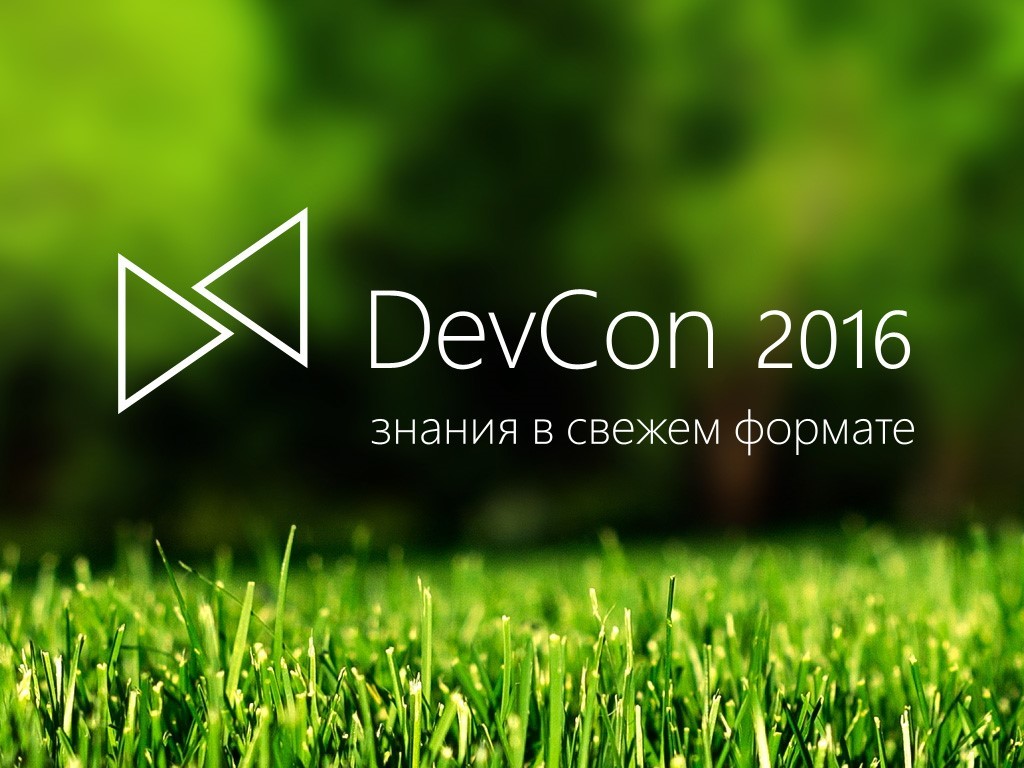
Having rested a bit in the summer, we began to think what to do with the conference further. Although making radical changes is not an end in itself, we had a lot of rather stormy meetings inside, trying to rethink the conference and allowing ourselves places to make significant deviations from the classic conference format.
')
Today, I will briefly go over some, as it is fashionable to say, conceptual changes and try to tell about our motivation behind them.
Today they talk a lot about openness and the importance of open dialogue with the community. For us, it is important that this is not just pathetic words, and bring mutual benefits. This year we decided that we need to talk more about how and why we are preparing DevCon so that, on the one hand, you can better understand what awaits you at the conference, and on the other, you can advise us something or on the contrary to criticize in advance.
One of the exercises in this area that we want to do regularly is to write about how and what we are doing. I hope our notes will be useful both to future participants and to the organizers of other conferences in general.
We also decided to minimize the “marketing” component in such notes, although at the end of each article you will easily find links to register and purchase tickets.
Before I talk about how the new DevCon works, I will briefly describe how, in terms of content, the old ones were arranged. Our former DevCons from the point of view of the program were arranged in a simple and understandable way:
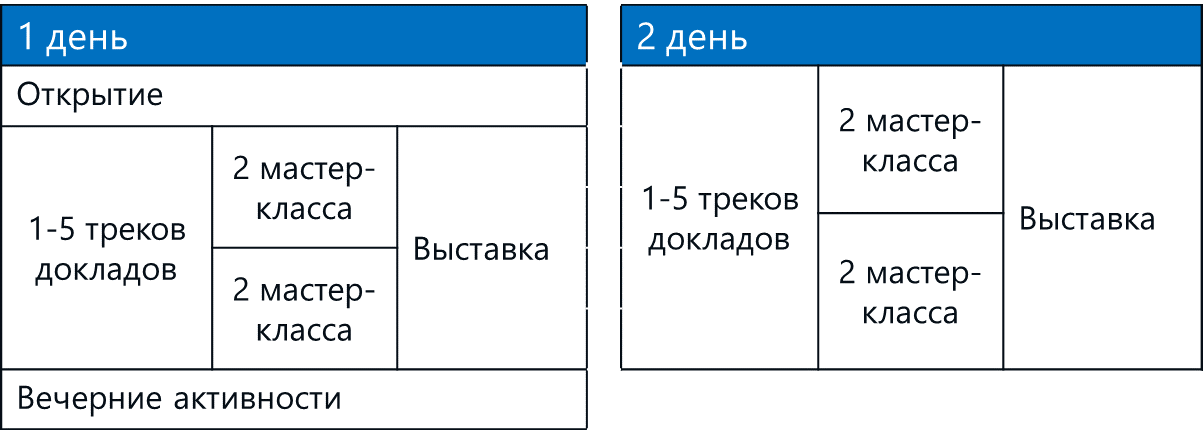
Traditional conference format
There is one big discovery, after which the participants are invited to go either to listen to the reports, or to listen to master classes, which are actually longer reports. You can also talk with experts and partners of the conference in the exhibition area.
In principle, almost every conference we do looks like this: the number of reports and simultaneous streams changes; master classes may or may not be; the exhibition is optional, but usually there; if the conference lasts two days, then the second one is similar in structure to the first.
Some internal cuisine:
In addition, each evangelist also, as a rule, delivers a report and can help to do any other “not his own” activities.
We began by analyzing the feedback from the conference participants, including those who could not get there and, for example, watched DevCon reports in a broadcast or recording. Added here their own feelings and comments from the speakers and partners.
For ourselves, we highlighted a few key points:
We also recalled past successful practices, such as conducting certification using Microsoft technologies right at the conference and high-grade expert zones, to which we have paid insufficient attention in recent years.
I will begin with the most important thing: we decided to add a completely new participation format for us - intensives .
The idea behind this format is very simple: the deepest immersion in the topic in a short time. In fact, intensive is the replacement of a similar technological track with a significant shift towards practice and discussion.
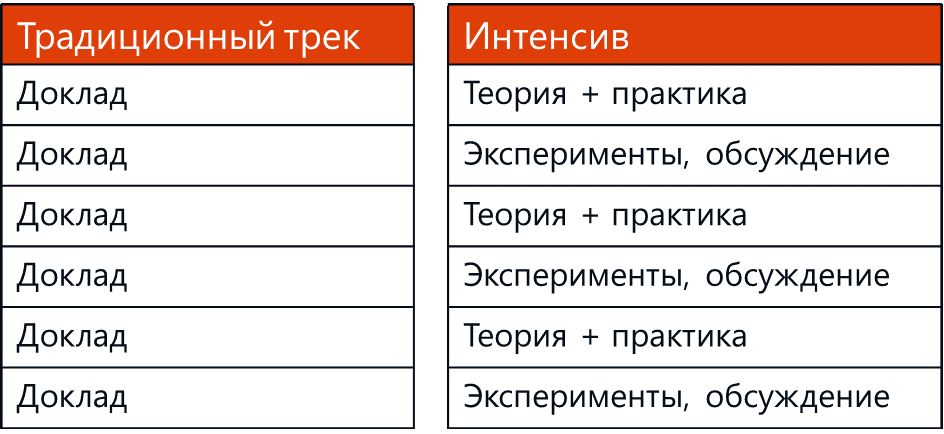
The difference between the traditional track and the intensive
You probably felt this effect more than once: you listened to an interesting report, were inspired by something, maybe even wrote down the names of useful tools or links, but when you returned home or to work, everything somehow does not coincide with yours. expectations during the report. That hands do not reach, it is not clear how to approach, then there is not enough time to figure everything out.
We decided that it’s time to add a format in which you can not only learn about new technologies, but also try them in the code right away. We listened to the theory - we must immediately fix it in practice, and at the same time, surely, new questions and subtleties will emerge that you did not think to ask or find out.
Unlike traditional laboratory work, where you follow a set of exercises according to the finished scheme, we want to add experimental elements. In some ways, it resembles mini hackathons.
Unfortunately, this intensive format also sets a certain framework - in order for work and communication to be quite effective, we have to limit the number of participants. Therefore, each intensive course is designed for approximately 50 participants and requires a separate registration.
Today, in the framework of DevCon, we decided to hold four such intensives (my colleagues responsible for each of the intensives are shown in parentheses):
As I wrote above, we consider intensive as a modern replacement for the traditional technological track. Therefore, if you want to understand the appropriate direction, then this is what you need. The important point: we assume that by signing up for intensive, you pass it from beginning to end.
Having added intensives, we decided not to stop and also took into account the other considerations mentioned above on the format of the conference. There is an interesting nuance here, which we discussed a lot inside: how, having mixed a lot of activities, not to spoil the event and not to slip into an incomprehensible "hodgepodge" of everything and everything.
As a result, we came up with a simple recipe: on the one hand, to keep the traditional working format in sufficient quantity, somewhat reducing its volume, and on the other hand, just add new “experimental” formats, allocating enough resources for their preparation to be sure quality.
The new format is as follows:
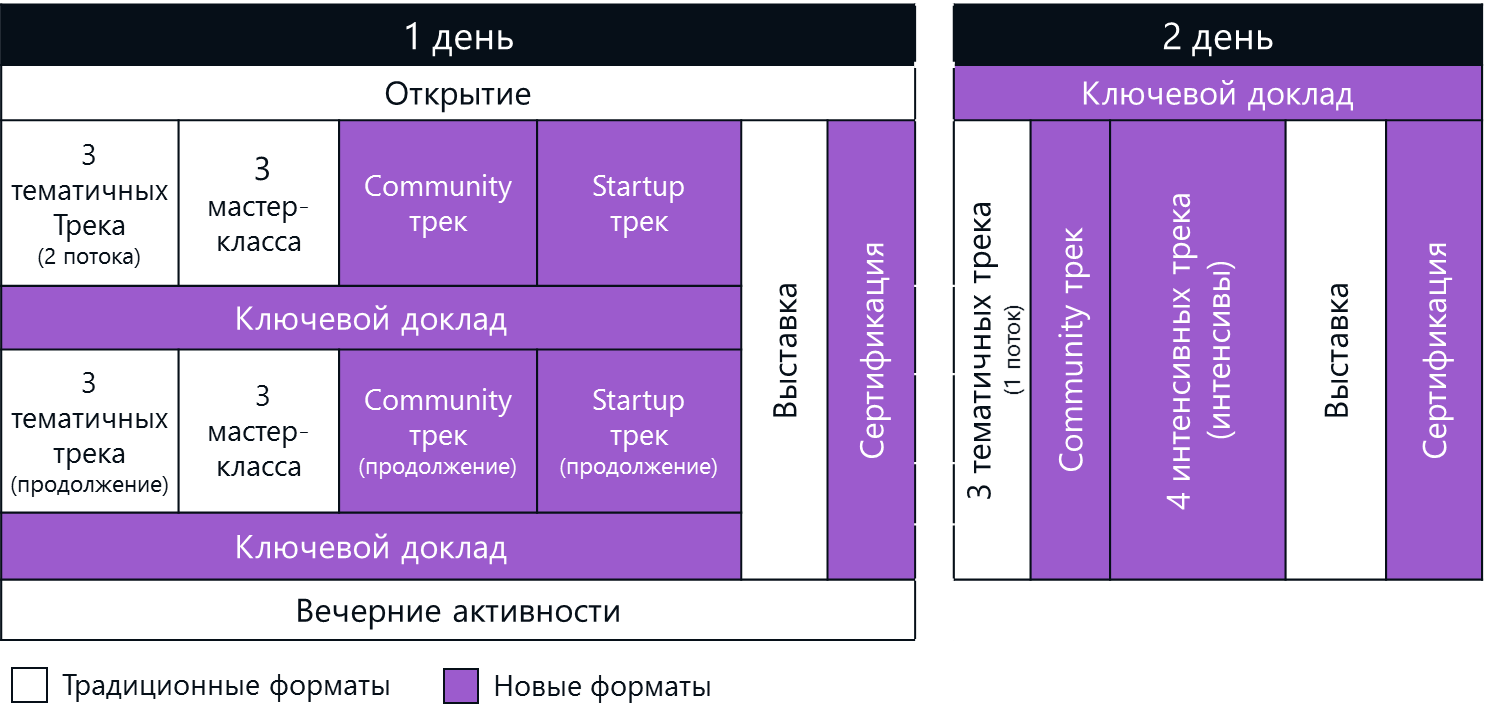
Technological tracks and master classes correspond to the three declared topics of the conference (the responsible person is indicated in brackets):
And for reports from external experts, we added two special tracks:
In more detail about the structure of the grid and in general the formation of the program we will tell in separate notes on the preparation of DevCon.
Finally, the promised block about tickets and how they relate to the conference program. We decided to allocate three types of tickets - depending on the days of participation and visit intensives: DevCon, DevCon Lite and GuestPass.
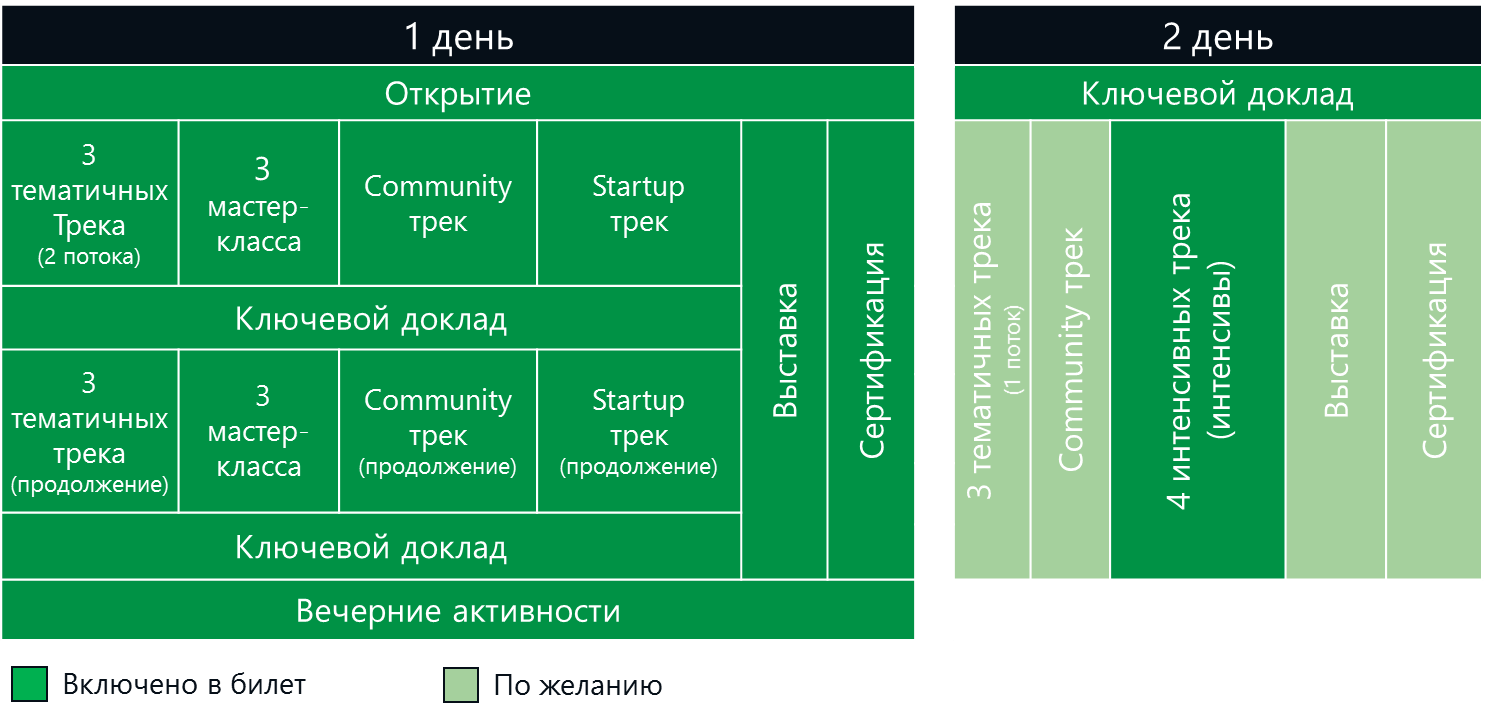
In the “intensive” version the participant of both days of the conference has the opportunity to take part in all the activities of the event. There are several technical limitations:
A night stay at the hotel, evening program and meals are also included. In addition, participation in the intensive process involves obtaining the necessary “materials” for participation. In fact, the cost of such equipment makes up the difference in price with the second type of tickets - DevCon Lite.
Let me remind you that when buying a DevCon ticket, you will also need to choose one of the intensives for yourself.
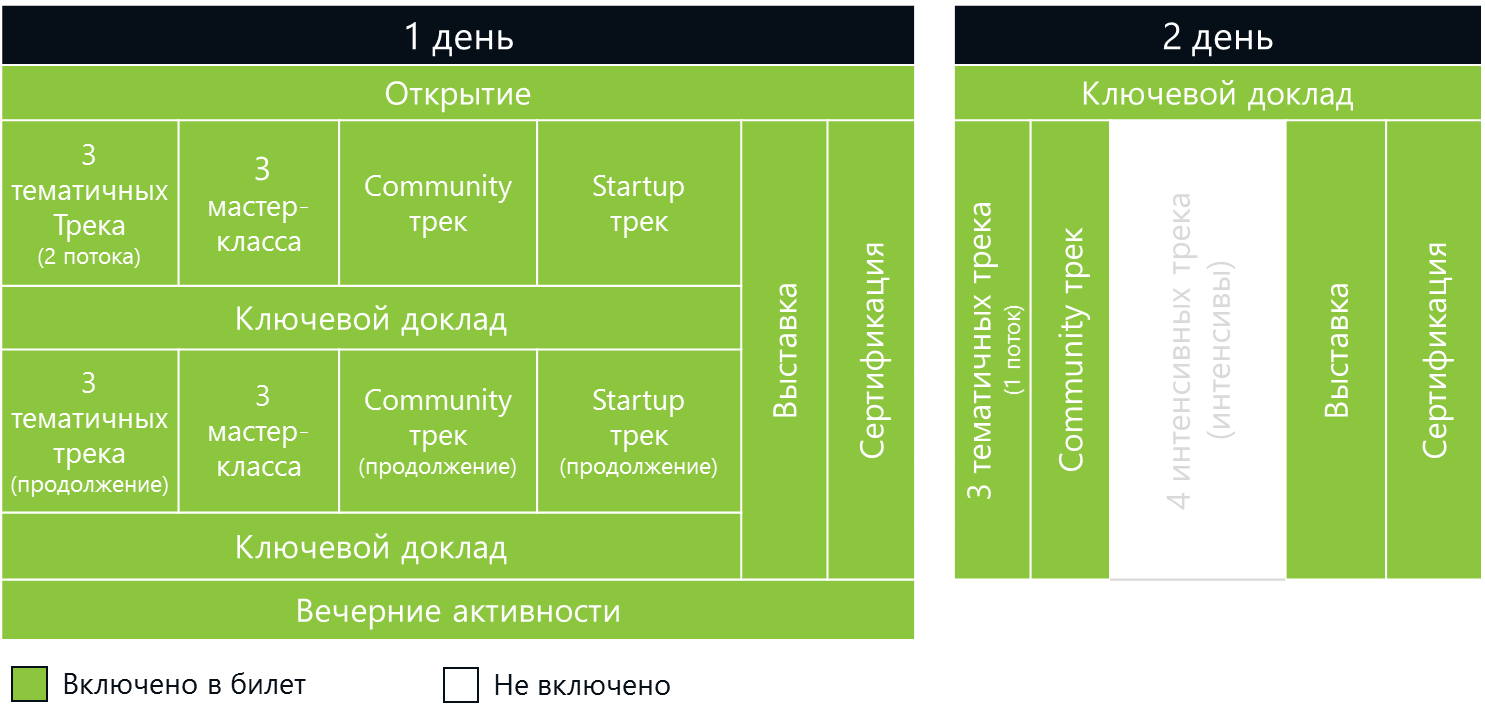
The second option is all the same, only without intensiveness. Certification must also be recorded in advance and only if available. Accommodation and meals are included in the ticket price.
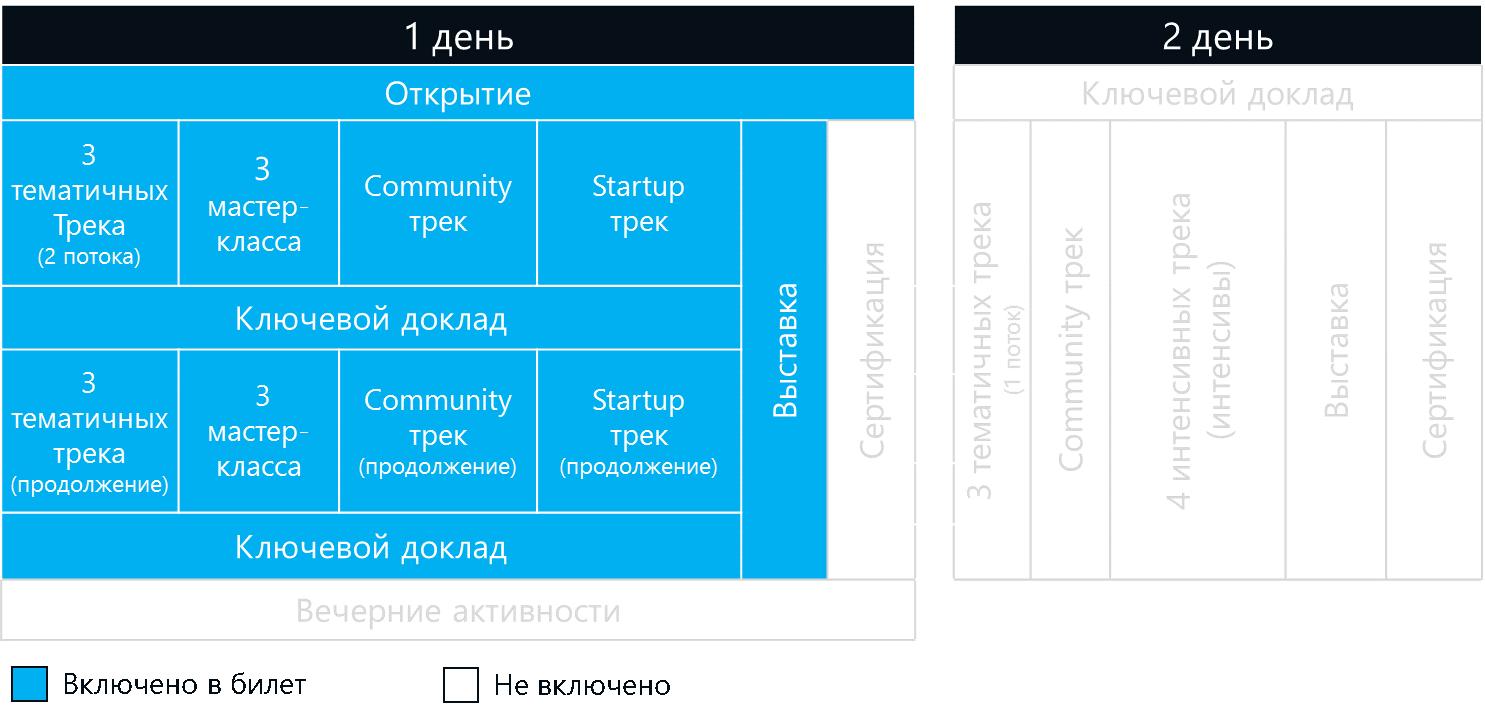
Finally, GuestPass is the one-day conference visit option. It does not include the activities of the second day, evening activities, certification, accommodation and dedicated meals (but at the site you can buy food and drinks yourself).
We tried to make such tickets as affordable as possible.
Summing up, we can say that we decided to make the first day of the conference more massive and educational, and the second one as deep and intense as possible.
We are waiting for you at DevCon.

Having rested a bit in the summer, we began to think what to do with the conference further. Although making radical changes is not an end in itself, we had a lot of rather stormy meetings inside, trying to rethink the conference and allowing ourselves places to make significant deviations from the classic conference format.
')
Today, I will briefly go over some, as it is fashionable to say, conceptual changes and try to tell about our motivation behind them.
More openness
Today they talk a lot about openness and the importance of open dialogue with the community. For us, it is important that this is not just pathetic words, and bring mutual benefits. This year we decided that we need to talk more about how and why we are preparing DevCon so that, on the one hand, you can better understand what awaits you at the conference, and on the other, you can advise us something or on the contrary to criticize in advance.
One of the exercises in this area that we want to do regularly is to write about how and what we are doing. I hope our notes will be useful both to future participants and to the organizers of other conferences in general.
We also decided to minimize the “marketing” component in such notes, although at the end of each article you will easily find links to register and purchase tickets.
Conferences format, tracks, activities, etc.
Before I talk about how the new DevCon works, I will briefly describe how, in terms of content, the old ones were arranged. Our former DevCons from the point of view of the program were arranged in a simple and understandable way:

Traditional conference format
There is one big discovery, after which the participants are invited to go either to listen to the reports, or to listen to master classes, which are actually longer reports. You can also talk with experts and partners of the conference in the exhibition area.
In principle, almost every conference we do looks like this: the number of reports and simultaneous streams changes; master classes may or may not be; the exhibition is optional, but usually there; if the conference lasts two days, then the second one is similar in structure to the first.
Some internal cuisine:
- For the content of the conference, the formation of the grid and the content from our side are exclusively technological evangelists. Contrary to the opinion existing in narrow circles, we have no clear goals to sell something and there are no corresponding KPIs. Our task is to tell a complete story about the platform: from a review of the general state of affairs to specific examples from our own practice and the experience of our partners and market experts.
- The conference always has one main content manager (in English, the content owner), who is responsible for the general vision of the conference and the coherence of different reports, etc.
- In accordance with the theme of the conference (for example, there were five key themes in the past DevCon) tracks are formed. Each track has its own responsible (track owner), versed in the subject and responsible for creating a complete picture already within his area of responsibility, he also invites speakers to his track.
- Each special activity, be it discovery, laboratory work, or hackathon, also has its responsible, usually not intersecting with the tracks.
In addition, each evangelist also, as a rule, delivers a report and can help to do any other “not his own” activities.
How did we come up with the need for change?
We began by analyzing the feedback from the conference participants, including those who could not get there and, for example, watched DevCon reports in a broadcast or recording. Added here their own feelings and comments from the speakers and partners.
For ourselves, we highlighted a few key points:
- The current demand for a day visit to the conference, without accommodation and other expenses. Although we are still confident that a two-day immersion in technology is the most valuable thing, we decided that we can really add a new form of participation. This has certain implications, I will talk about them a little lower, and we will also discuss them in other notes.
- Traditional presentations and master classes are good. But, there is a shortage:
- overview reports describing Microsoft’s strategy in one direction or another and giving a holistic understanding of the current state of technology;
- practical reports from experts from the fields who have tried new technologies, and, as they say, "having something to say."
- Not enough practice - activities in which you can not only listen, but immediately try and discuss.
- Despite the fact that the conference is about the development, there is an obvious demand for a business component.
We also recalled past successful practices, such as conducting certification using Microsoft technologies right at the conference and high-grade expert zones, to which we have paid insufficient attention in recent years.
What have we changed in the new DevCon?
I will begin with the most important thing: we decided to add a completely new participation format for us - intensives .
What is intense?
The idea behind this format is very simple: the deepest immersion in the topic in a short time. In fact, intensive is the replacement of a similar technological track with a significant shift towards practice and discussion.

The difference between the traditional track and the intensive
You probably felt this effect more than once: you listened to an interesting report, were inspired by something, maybe even wrote down the names of useful tools or links, but when you returned home or to work, everything somehow does not coincide with yours. expectations during the report. That hands do not reach, it is not clear how to approach, then there is not enough time to figure everything out.
We decided that it’s time to add a format in which you can not only learn about new technologies, but also try them in the code right away. We listened to the theory - we must immediately fix it in practice, and at the same time, surely, new questions and subtleties will emerge that you did not think to ask or find out.
Unlike traditional laboratory work, where you follow a set of exercises according to the finished scheme, we want to add experimental elements. In some ways, it resembles mini hackathons.
Unfortunately, this intensive format also sets a certain framework - in order for work and communication to be quite effective, we have to limit the number of participants. Therefore, each intensive course is designed for approximately 50 participants and requires a separate registration.
Today, in the framework of DevCon, we decided to hold four such intensives (my colleagues responsible for each of the intensives are shown in parentheses):
- Internet of things: software experiments with weather prediction and smart home (Dmitry Soshnikov, shwars )
- Development of modern web applications on the open platform ASP.NET 5 (Vladimir Yunev, XaocCPS )
- DevOps with Visual Studio: how to improve the interaction between the development and management of infrastructure (Maria Gorelkina maria_gore and Alexander Shapoval ashapo )
- Design applications under Windows 10 for those who care (Konstantin Kichinsky, kichik )
As I wrote above, we consider intensive as a modern replacement for the traditional technological track. Therefore, if you want to understand the appropriate direction, then this is what you need. The important point: we assume that by signing up for intensive, you pass it from beginning to end.
New DevCon format
Having added intensives, we decided not to stop and also took into account the other considerations mentioned above on the format of the conference. There is an interesting nuance here, which we discussed a lot inside: how, having mixed a lot of activities, not to spoil the event and not to slip into an incomprehensible "hodgepodge" of everything and everything.
As a result, we came up with a simple recipe: on the one hand, to keep the traditional working format in sufficient quantity, somewhat reducing its volume, and on the other hand, just add new “experimental” formats, allocating enough resources for their preparation to be sure quality.
The new format is as follows:

Technological tracks and master classes correspond to the three declared topics of the conference (the responsible person is indicated in brackets):
- Windows 10 & More Personal Computing (Dmitry Andreev, dmandreev )
- Microsoft Office & Productivity + Business Processes (Konstantin Goldstein, goldkostya )
- Microsoft Azure & Intelligent Cloud Platform (Alexander Belotserkovsky, ahriman )
And for reports from external experts, we added two special tracks:
- Community track (Alexander Belotserkovsky, Marina Terzi)
- Startup-track (Natalia Radosteva, Konstantin Goldstein)
In more detail about the structure of the grid and in general the formation of the program we will tell in separate notes on the preparation of DevCon.
Conference Tickets
Finally, the promised block about tickets and how they relate to the conference program. We decided to allocate three types of tickets - depending on the days of participation and visit intensives: DevCon, DevCon Lite and GuestPass.
DevCon Ticket

In the “intensive” version the participant of both days of the conference has the opportunity to take part in all the activities of the event. There are several technical limitations:
- No one has yet invented a machine that allows a person to be in several places at the same time.
- Certification must be recorded in advance and the number of places is limited for technical and logistic reasons.
- We must also record on the intensive, and although we do not limit the visit to parallel activities, we still assume that the maximum benefit will be obtained by attending the intensive activity all day.
A night stay at the hotel, evening program and meals are also included. In addition, participation in the intensive process involves obtaining the necessary “materials” for participation. In fact, the cost of such equipment makes up the difference in price with the second type of tickets - DevCon Lite.
Let me remind you that when buying a DevCon ticket, you will also need to choose one of the intensives for yourself.
DevCon Lite Ticket

The second option is all the same, only without intensiveness. Certification must also be recorded in advance and only if available. Accommodation and meals are included in the ticket price.
GuestPass Ticket

Finally, GuestPass is the one-day conference visit option. It does not include the activities of the second day, evening activities, certification, accommodation and dedicated meals (but at the site you can buy food and drinks yourself).
We tried to make such tickets as affordable as possible.
Summing up, we can say that we decided to make the first day of the conference more massive and educational, and the second one as deep and intense as possible.
We are waiting for you at DevCon.
Source: https://habr.com/ru/post/273143/
All Articles